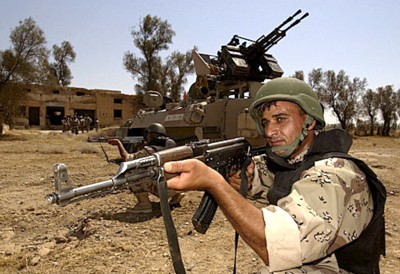Flaws Cited in Effort To Train Iraqi Forces

The U.S. military's effort to train Iraqi forces has been rife with problems, from officers being sent in with poor preparation to a lack of basic necessities such as interpreters and office materials, according to internal Army documents.
The shortcomings have plagued a program that is central to the U.S. strategy in Iraq and is growing in importance. A Pentagon effort to rethink policies in Iraq is likely to suggest placing less emphasis on combat and more on training and advising, sources say.
In dozens of official interviews compiled by the Army for its oral history archives, officers who had been involved in training and advising Iraqis bluntly criticized almost every aspect of the effort. Some officers thought that team members were often selected poorly. Others fretted that the soldiers who prepared them had never served in Iraq and lacked understanding of the tasks of training and advising. Many said they felt insufficiently supported by the Army while in Iraq, with intermittent shipments of supplies and interpreters who often did not seem to understand English.
The Iraqi officers interviewed by an Army team also had complaints; the top one was that they were being advised by officers far junior to them who had never seen combat.
Some of the American officers even faulted their own lack of understanding of the task. "If I had to do it again, I know I'd do it completely different," reported Maj. Mike Sullivan, who advised an Iraqi army battalion in 2004. "I went there with the wrong attitude and I thought I understood Iraq and the history because I had seen PowerPoint slides, but I really didn't."
Gen. John P. Abizaid, the top U.S. military commander for the Middle East, told Congress last week that he plans to shift increasing numbers of troops from combat roles to training and advisory duties. Insiders familiar with the bipartisan Iraq Study Group say that next month the panel will probably recommend further boosts to the training effort. Pentagon officials are considering whether the number of Iraqi security forces needs to be far larger than the current target of about 325,000, which would require thousands more U.S. trainers.
Read the rest at the Washington Post
Related Link:
Marines in Iraq Expanding Adviser Teams
Related Link:
Expert: Iraq army has only 50% chance of success, no U.S. troop reductions foreseeable

<< Home